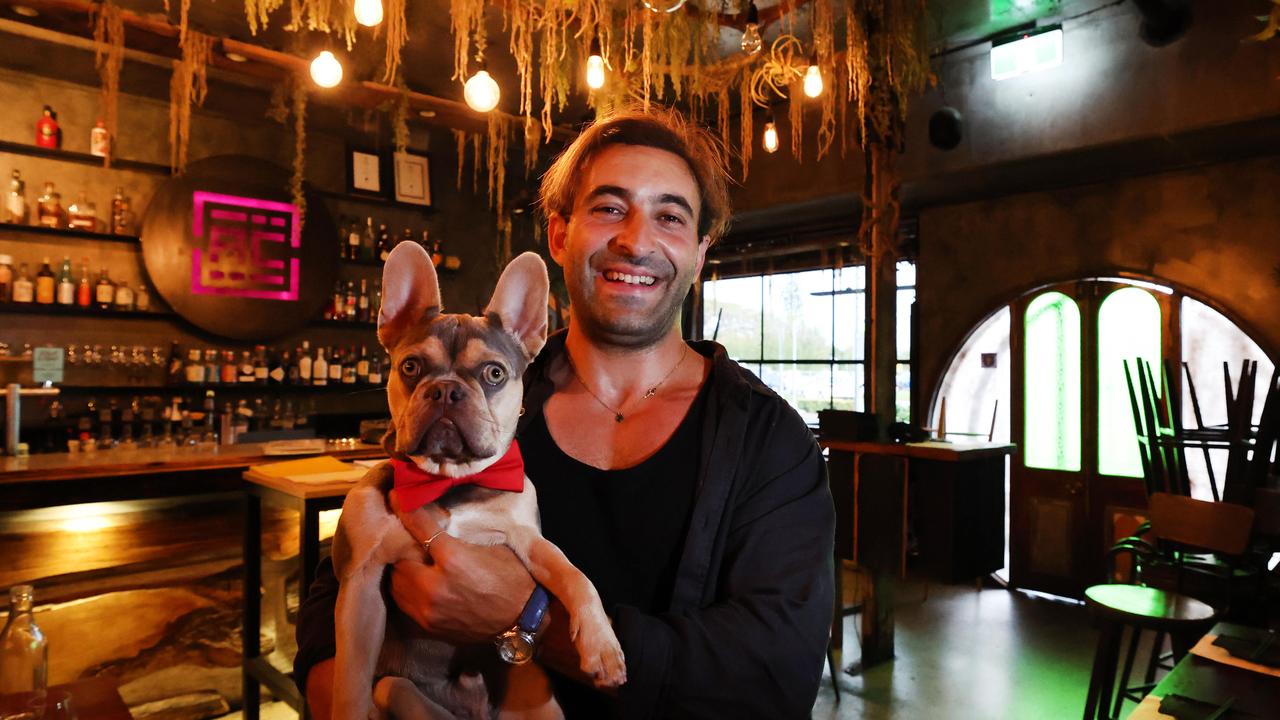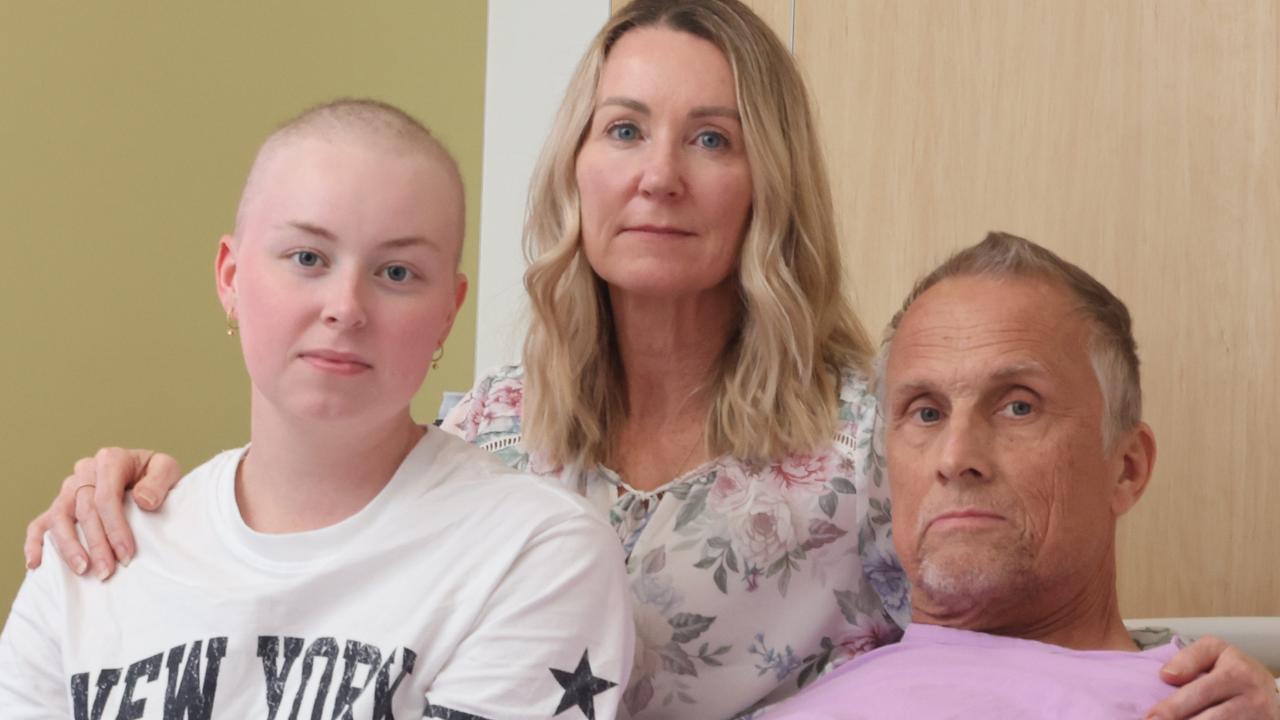‘They twisted my head around until my neck broke’: From bullied kid to millionaire coffee king
He may now be a self-made millionaire and father of four, but Zarraffa’s founder Kenton Campbell’s road to success has not been an easy one.
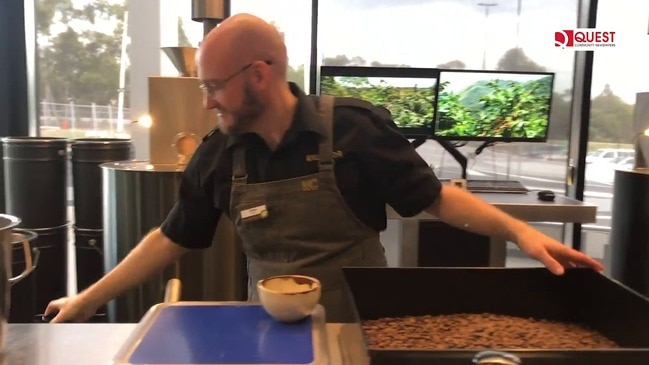
Gold Coast
Don't miss out on the headlines from Gold Coast. Followed categories will be added to My News.
WHEN it comes to the coffee industry, Kenton Campbell has ‘bean’ there, done that. Boom-tish.
Bad puns aside, in Campbell’s case, it’s true: from his early days as a coffee cart operator on the streets of his native America to opening his first roastery and cafe on the Gold Coast that became the foundation of his Zarraffa’s empire, Campbell – like Dean Merlo and Phillip Di Bella – has become a Queensland caffeine king.
He has also beaten cancer, become a wildlife warrior after befriending Steve and Bob Irwin and, as a committed corporate philanthropist, given back some of the millions he’s made from selling countless cups of coffee.
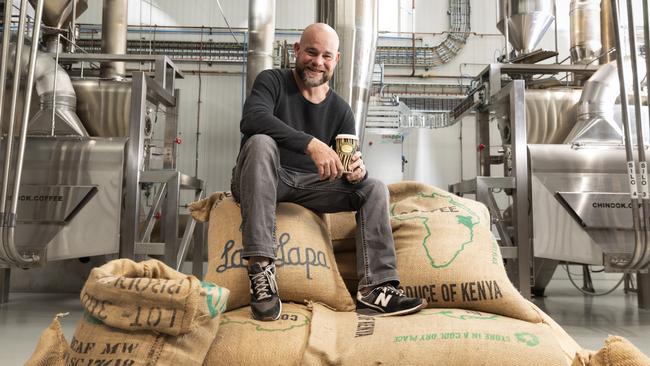
Now, 25 years after establishing Zarraffa’s and with his three sons involved in the business, Campbell, 51, is moving on to the next chapter of his entrepreneurial success story with his sprawling Distillery Road Market development, inspired by New York’s famous Chelsea Market and London’s Borough Market, between Brisbane and the Gold Coast.
For a Californian kid who left home at 15, dropped out of high school after his neck was broken by bullies and changed his name to help escape his ‘horrible’ childhood, Campbell has done okay.
But when he says it’s about ‘purpose’ rather than the money – and the tears well up in his eyes – you get a palpable sense that he’s not just another hard-nosed rich businessman out to get even richer.
“I had a penta-shot this morning,” Campbell says.
He’s normally a four-shot coffee guy but today he’s upped it to five. I’m not sure if it’s the high caffeine intake but every time I’ve met him, he’s buzzing.
Energy, enthusiasm and passion bubble like a milk frother in one of his 70-plus Zarraffa’s outlets as Campbell, in his still strong American twang, talks.
And he admits he likes to talk.
In a 2017 interview with Australian Story, Campbell recalled asking his wife Rachel what she thought of him the first time they met. “Yeah, pretty good when you shut up,” she told him. “Thought you were kind of cute when you shut up.”

Another coffee in hand, and the heady whiff of freshly-roasted beans in the air, Campbell is talking excitedly as he shows Qweekend around Distillery Road Market, next to the historic Beenleigh Rum Distillery just off the M1 at Eagleby.
His $50 million new passion project, which also houses Zarraffa’s HQ, is located in a derelict former DFO outlet that never got off the ground, and which Campbell bought for $12.5 million from receivers in 2015 through his Tonken Property Group.
It’s being transformed into what he reckons will be ‘one of the world’s great markets’, boasting high-end produce outlets, eateries, nine bars, a brewpub, art and crafts stalls, live entertainment and even an esports arena overseen by his eldest son Vaughn, 22 – brother to Zachary, 19, and Aareton, 17 (Campbell also has a daughter, Jessica, 30, and a grandson, 10, from a previous relationship in the US).
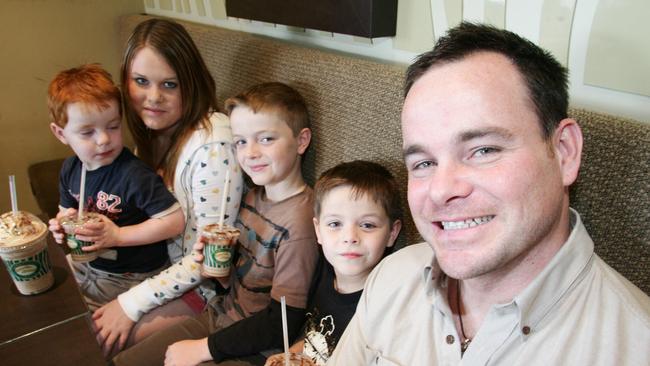
Outside DRM is the popular Sugar Creek Smokehouse, a Texas BBQ/beer garden venue that Campbell opened last year in a shipping container as Covid disrupted development of the marketplace.
“It’s sort of my mental superannuation as well as my family super,” Campbell says of DRM.
“I’ve been referred to (in the media) as being like Willy Wonka on steroids. Well here, I feel like I really am in a wonderland of retail.
“Covid has delayed things but it’s been a bit of a blessing in disguise because it’s allowed me to take it to a whole ‘nother level. It was going to be really good; now it’ll be crazy good.”
CAMPBELL thinks he’s probably always had an entrepreneurial streak, going back to his early days in Eugene, Oregon, where he was raised.
He made his first dollar collecting bottles in a shopping trolley around his neighbourhood, redeeming them for coins at the local Safeway supermarket.
“I liked M & Ms and Coke and I wanted to get my own way of getting them, I suppose, so I started to collect bottles from people that lived in apartment complexes around my neighborhood in a Safeway cart,” he recalls.
“I broke five bucks which was my goal and I went out and bought a big half pound of M & Ms and a two or three-litre Coke. AndI drank and ate it all and vomited it up and then I went ‘I want to do that again … that was great!’.”
Later, as a ‘freckle-faced copper-topped kid’, he remembers a housing development springing up and blocking views of the drive-in theatre where he used to be able to watch movies for free by climbing onto his roof.
“I asked the contractor what they were doing and he told me they were building houses to make money.
“Even at that age, I was like ‘ah, so if you build stuff, you can make money’.”
Campbell’s parents split up when he was still a baby. His mother remarried but he had an unhappy home life, ran away several times and by 13 was living with his grandparents.
He returned to live with his mum and stepfather but left again and dropped out of high school at 15 after relentless bullying and a brutal beating.
“I was abused when I was at high school, I had my neck broken,” he says.
“Literally two kids held me down and another one twisted my head around until my neck broke. Everybody said ‘it’s peer pressure’. Nobody (at home) fought for me.”
Campbell notes that the school, Thurston High, was the scene of America’s first school massacre when 15-year-old Kipland Kinkel, who had been expelled, opened fire on campus – killing two classmates and wounding 25 others – in May 1998.
“Probably the only difference between me and him (Kinkel) was that I was smart enough to realise that I needed to get out,” he says.
“I look back and think ‘geez, I made it because I was smart enough to leave’.”
Campbell moved in with a friend and got a cleaning job at a local taco outlet. He also obtained a legal emancipation from his parents and sat his high school proficiency exam.
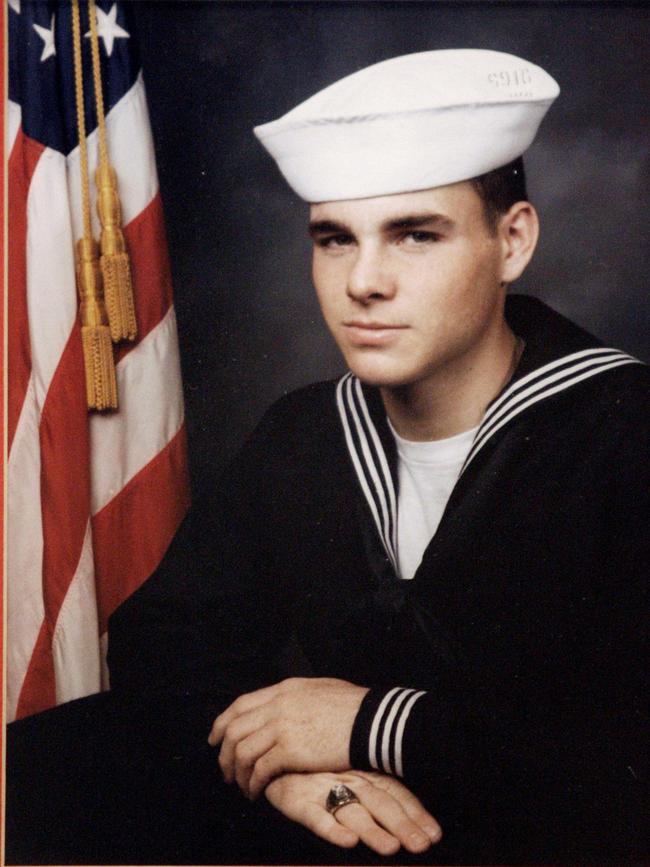
Then, at 17, he joined the US Navy to become a clearance diver, but was medically discharged just before the 1990 Gulf War.
“I cried when they told me I was being discharged,” he says.
“Then, six months later, the Gulf War happened and two of my friends were killed in friendly fire. I kind of went ‘oh, alright, stop crying and get on with your life’.”
Campbell started a cleaning business in Eugene and it was there where someone first called him an entrepreneur.
“This client was a businessman and he called me into his office, sat me down and asked me what I was doing cleaning his windows when clearly I was an entrepreneur. I was like ‘entrepre-what?’,” he says.
“He said that he saw in me a sincere passion for life and a really good attitude. No one had ever said that to me before and for the first time I had a name to describe how I felt inside – entrepreneur!”
From there, Campbell took a job selling advertising, which led to another key moment on the road to success.
“A gentleman told me if I wanted to sell him this particular advertising deal then I had to drink one of his coffees. Now, I didn’t like coffee and all my coffee experiences up until that time had been instant coffee, but he added chocolate and made me a coffee that I fell in love with.”
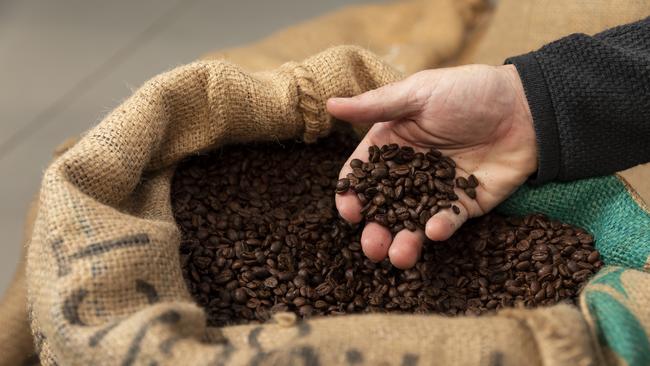
In 1993, Campbell opened his first coffee cart business in Seattle, where he’d docked while in the navy. It led to a chance meeting with two Aussies from the now much-maligned Retail Food Group franchising company.
“I told them that they couldn’t walk away without trying one of my coffees and they enjoyed it so much they came back everyday for a week,” he says.
“Each day I would greet them by name and make up their order from memory. It must have made quite an impression because at the end of the week, they offered me a job to relocate to Australia.”
Campbell made the move in 1995, working as a coffee consultant to RFG. But the gig only lasted a year and he was left without a job.
He’d met his future wife, sports massage therapist Rachel, when she treated him for injuries he suffered in a bad car crash in his first week in Australia.
He persuaded her to co-sign a $9000 personal loan to get what would become Zarraffa’s off the ground. The company was named after the Arabic word for giraffe, zarafa, with twin Masai giraffes as its logo.
What started as a small roastery and cafe in the backblocks of Southport on the Gold Coast has grown into a chain of 73 outlets through Queensland, NSW and Western Australia.
“I felt like an immigrant when I came here … I felt like everything was possible. My whole early life felt like a mistake, if I looked at it. It was certainly a whirlwind of learning – what not to do, what to do,” Campbell says.
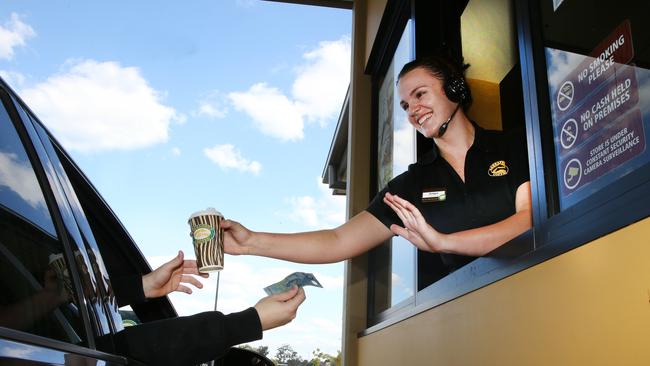
Most Zarraffa’s stores are now drive-through outlets after the franchise chain began withdrawing from high-rental shopping centres, a process Campbell says is being fast-tracked during the pandemic.
Its 13 remaining stand-alone stores include Zarraffa’s first shopping centre outlet at Southport’s Australia Fair, and the expansive Kiwanda Cafe in the Distillery Road Market complex.
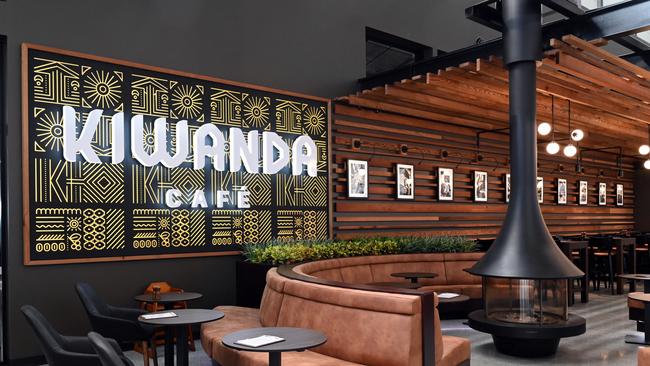
About a decade ago, in line with Campbell’s goal to become a leading purveyor of high-quality, specialty coffee, he established a special relationship with the Meru coffee co-op in the foothills of Mt Kenya.
He’d stumbled on the co-op, which supports about 1000 families and 20 schools, during a trip to Kenya, after he asked a bartender if he knew any local coffee growers.
“I went the following day and literally bought the next year’s Ntongoro Single Origin crop on the spot,” he says.
As well as buying its coffee, Zarraffa’s supports the co-op with plants, equipment and seedling nurseries. Part of the deal involves helping fund the neighbouring Lewa Wildlife Conservancy, which is involved in protecting rare and endangered black rhinos.
“I could buy coffee from anywhere in Kenya, but I told the Meru farmers that I choose to buy it from them, because the trade agreement involved helping to protect rhinos from poaching and extinction,” he says.
“It’s gratifying to know that the black rhino population is steadily recovering and there are now over 600 black rhinos in Kenya, and our coffee partnership has helped contribute to this in a small way.”
Campbell says his passion for wildlife conservation was whetted by meeting Steve and Bob Irwin in the early 2000s, and later helping Irwin Sr on projects including saving hairy-nosed wombats from farmer’s guns and ploughs in South Australia.
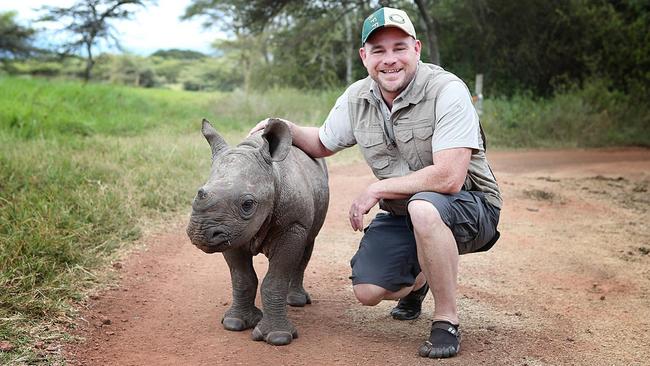
Sitting in the Zarraffa’s HQ theatre, watching a moving company documentary on the Kenyan coffee alliance, Campbell starts crying.
He’s watched the docco multiple times but the sight of his Kenyan ‘brothers’, whom he hasn’t seen since the pandemic began, brings him to tears.
“My boys have come with us a couple of times (to Kenya) and they’ve said ‘when are we going back to see our ‘family’,” he says, red-eyed.
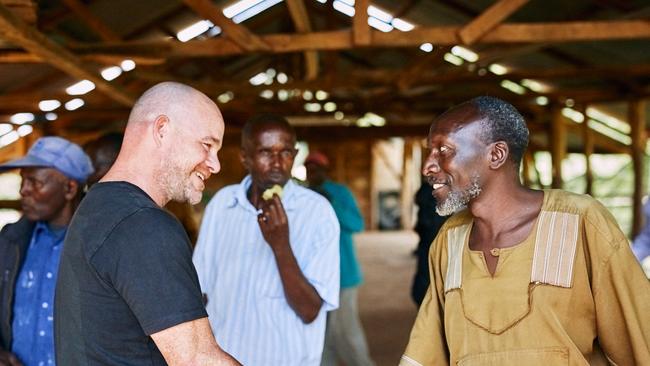
Earlier, he motions to a sign behind the counter in the Kiwanda Cafe, explaining it was made by a signwriter for the first Zarraffa’s store and who died soon after it opened.
“That’s there to remind me of all the people that I’ve had a cup of coffee with that aren’t here any more,” he says quietly.
FOR years, Campbell was known by his middle name, Mark, but he reverted to Kenton in his 20s as a way of putting his past behind him.
“Here’s the thing: many people who have been through adversity in their youth needed it to become the people that they are today, and I’m one of those,” he says.
“It was that bad, from my point of view, that I wanted it to be a chapter, not who I was. So I changed my name back to Kenton and everything started to change for me.
“I said ‘I don’t want to be Mark any more’. That’s who everybody else thinks I was but that’s not who I am.”
Besides which, Campbell adds, “Kenton is a pretty cool name’.
He initially set out to make money ‘to give the middle finger’ to everybody who had doubted him, notably some members of his own family.
But events including Steve Irwin’s death in 2006 and a ‘life-changing’ brush with throat cancer in 2013, gave him perspective and ‘purpose’.
“My (initial) thing was, I’ll make money and it’ll make everything better,” he says.
“It was basically f. k you, I’ll show you’. I was angry that people couldn’t see what I could see, and they were holding me back. It drove my hunger to disprove them, it drove my ambition.
“My work ethic, though, backed it. – I didn’t just talk. I worked 100-plus hours a week for years. I talked the talk but I walked harder than I talked, which is hard for people to believe (laughs).
“I think it was my driver. If I make money, that’ll be success. But I found that success is not about how much money I have, it’s about seeing other people succeed and who I’m able to enjoy life with along the way.
“Because when I die, they’re not going to remember me because I had a bunch of money.”
It’s why, Campbell says, that he’s supporting coffee farmers and rhino conservationists in Kenya, donating tens of thousands of dollars to medical research and other causes and helping set up Zarraffa’s staff in their own franchises.
Why he wants Distillery Road Market to be a launching pad for a new generation of entrepreneurs, as well as a breeding ground for music stars.
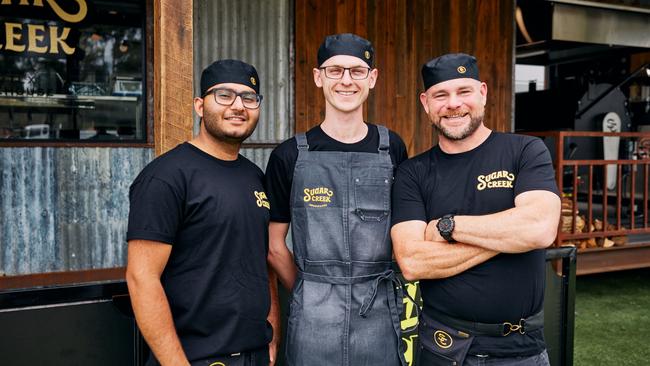
“Zarraffa’s is something me and Rachel have done but it’s not who we are,” he says.
“It’s a big something, bigger than I ever could have thought. But I’m proud to see now that the franchisees and staff have taken the baton and they’re the ones that are going to make it a stayer in the marketplace.
“Not one person, whether it’s in business or in conservation, can do everything on their own.”
Of DRM, he says.
“There’s gotta be someone who becomes successful out of this, I know it. I’m going to make sure there’s an environment there for them to do it. We’re going to have a real good time here. This is going to be great!”
Campbell says some people are sceptical of his success.
“People think they know who I am – they think I’m too young, that I must have been gifted this thing,” he says.
“But I think in business or in life, everybody pays a toll and I paid my price early. That was the first 25 years. The second 25 was about putting all I learned to use. The next 25-plus is about enjoying it, and seeing other people get something from it.
“Because you can’t take it with ya.”
More Coverage
Digital exclusive: Read Qweekend the day before it’s printed
Originally published as ‘They twisted my head around until my neck broke’: From bullied kid to millionaire coffee king



